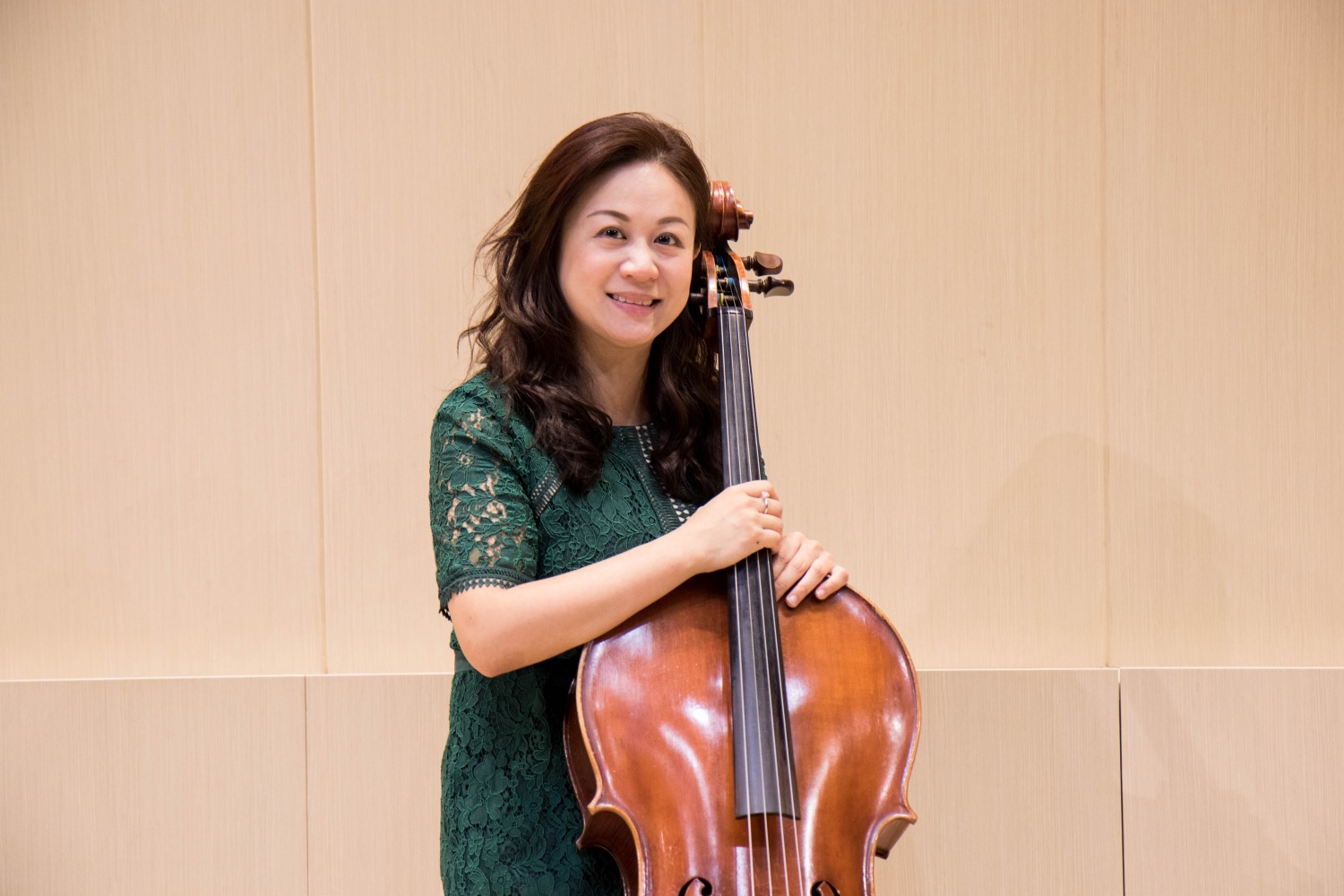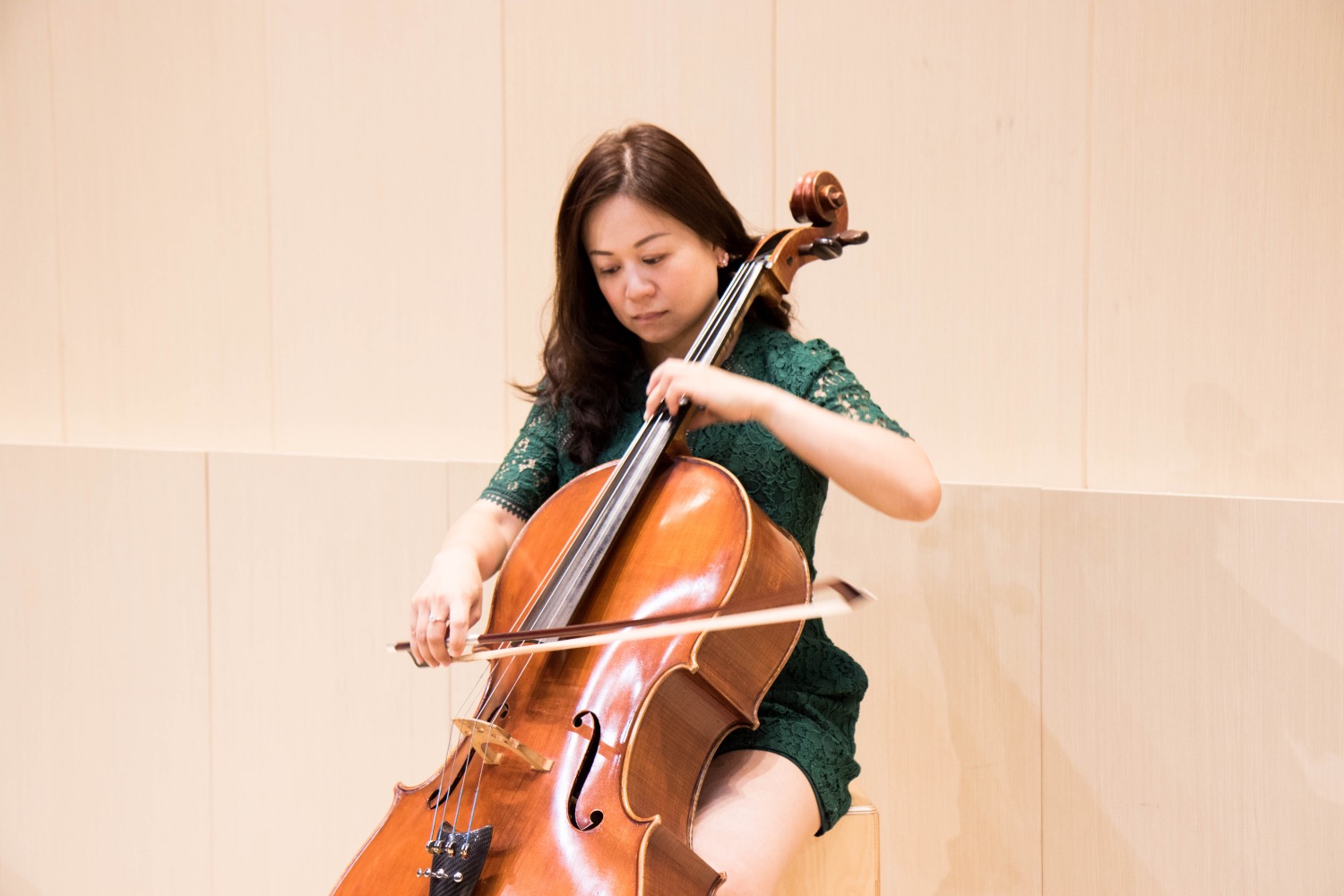A passion for music and music education #1 of 7
June 2, 2020
We sit with accomplished musicians heading the CAIS Specialized Orchestral Training Program and ask them to take us to the beginning of their musical journeys, what inspired them, how they nurtured their passion and talent for music, their professional careers and what led them to teach music to others.
 CELLIST – ANNA KWAN TON-AN
CELLIST – ANNA KWAN TON-AN
She is an acclaimed young virtuoso of the new generation started learning the cello when she was ten at the Hong Kong Academy for Performing Arts.
She received her Bachelor Degree at Oberlin Conservatory of Music and obtained her Masters of Music at Yale University.
Anna has worked with members of the Vermeer, Emerson, Colorado and Tokyo String Quartets. In 1992, she was chosen to be the only representative from Hong Kong to attend the Interlochen Arts Camp in Michigan, the USA with a full scholarship. She was principal cello of the Asian Youth Orchestra in 1995 and a member of the Jeunesses Musicales World Youth Orchestra, orchestra in residence of the Verbier Music Festival, Switzerland in 1996 and 1997. Anna also toured with the Yale Cellos, performing at the Manchester Cello Festival and Rencontre de Violoncelles in Beauvais, a CD of the concert was released for Calliope record label. Anna joined the Hong Kong Philharmonic Orchestra in 2001. In 2006 she was invited by Maestro Myung-Whun Chung to perform as a member of the Asia Philharmonic Orchestra to perform in Seoul, Korea.
(Brief excerpt from Hong Kong Chamber Music Society)
Vinod Khiatani (VK)
Anna Kwan (AK)
 You started studying cello at the age of 10 at the Academy of Performing Arts. Why is that the instrument you chose? Were there any other instruments you played?
You started studying cello at the age of 10 at the Academy of Performing Arts. Why is that the instrument you chose? Were there any other instruments you played?
I grew up in a musical family. My mother taught the piano when I was young. She had studied the piano in England and my brother was also playing the piano. At the age of 4, my mother arranged for me to learn the piano. I was fond of music and picked up the violin also. My mother also took us to the concerts and it was in one of the shows where I saw the famous cellist YoYo Ma playing that I decided I too want to play the cello. I grew up playing all 3 instruments but when I was accepted to the Academy of Performing Arts, I was advised to focus on playing one instrument and I chose the cello.
What memorable experience do you have during this time in your musical journey?
A definite highlight was when I was chosen to be the sole representative from Hong Kong at the Interlochen Arts Camp in Michigan, U.S.A. It was an 8-week camp but I thoroughly enjoyed every moment that I was there.
You have a history with the Asian Youth Orchestra, what was your first involvement with the Orchestra?
I was 15 when I was invited to be a member of the AYO. It was a wonderful experience and after my studies at Yale, I returned to Hong Kong having secured a spot with the Hong Kong Philharmonic Orchestra. It was at that time that I also joined the faculty of AYO and have been with them until present. So yes, first a member and now an instructor.
How did you land the spot on the Hong Kong Philharmonic Orchestra?
After receiving my Bachelor Degree at Oberlin Conservatory of Music, I continue my studies at Yale University pursuing the Masters of Music degree. It was a 2-year program and I had the privilege of being instructed by some of the best teachers/professors in the field among them the legendary cellist Aldo Parisot.
When I finished my Master degree, I thought it would help if I capped my studies with the Artist Diploma which would further enhance my performance capabilities. It was at that time that my mother informed me of the opportunity to audition for the Hong Kong Philharmonic Orchestra. I was reluctant in the beginning as I thought the odds were against me. I thought that surely there would be someone who would be better qualified than me but my mother encouraged me to try anyway. I auditioned and was offered the position. My professor at Yale was not happy that I would not be staying in the U.S.A. but I am glad I took the opportunity.
It seems like your mother has played a vital role in your musical journey?
Indeed, she has been very supportive throughout the journey. I have fond memories of our discussion growing up about the pros and cons of becoming a musician and the varied options available whether to be a solo performer or play in an orchestra etc. I am thankful for her guidance.
 When did the desire to teach the instrument develop in you?
When did the desire to teach the instrument develop in you?
It actually started when I was in Oberlin College. I enjoyed working with the students. That was my first teaching experience. But I got serious about it when I returned back to Hong Kong. I was teaching young children and I found that I enjoyed the relational aspects of teaching. It was very fulfilling. Music is a very expressive medium. For students to play well, they have to learn how to express themselves. So I find that teaching them, I had to get to know them personally and kind of mentor them not just in music but in other areas of their lives. Of course, seeing them progress and make music is very fulfilling.
Is there a particular age group that you enjoy working with? Alternatively, is there an ideal age in which one should begin to learn the cello?
I enjoy working with all age groups. Adult learners are more mature so they don’t waste much time. However, their fingering ability is slower and they may not be as nimble as the younger students. But I enjoy all age groups. There is no ideal age per say, but because the cello strings are thicker than violin strings and the instrument is heavier, it does require some strength to handle it. So, whereas violin could be picked up at an early age, I think slightly older say 5-6 years would be a good age to begin.
What approach do you take in teaching the instrument?
Playing string instruments is quite different from playing the piano for example, where you can immediately hit the keys and hear the sounds/tone. With string instruments, it is slightly different. I usually teach my students to sing. This is so that they can train their ears to listen to the pitch. I have found that this is foundational.
Do you see yourself getting more involved in teaching?
Definitely, I cherish my experience with the orchestra but I think I am at that stage in life where I want to pass on my accumulated knowledge and experience to young and emerging musicians. I find that I can contribute well in this area so that young musicians may develop their talents in the proper way and not succumb to poor instructions that are readily available today.
Do you listen to other music genres or play other instruments?
Nowadays, I find that I enjoy singing more. I enjoy watching singers as they master their craft, for example, their breathing techniques etc. Other than that, yes I listen to a wide variety of music.
Who are your favorite composers?
Besides CLASSICAL music, I enjoy listening to pop music. I think it is important to listen to a broad range of music whether orchestra music, solo piano music etc. It helps to develop the love for music in general. I have also ventured out of my comfort zone by playing pop music or playing the instrument in music videos for song artists. I enjoy the process very much.
